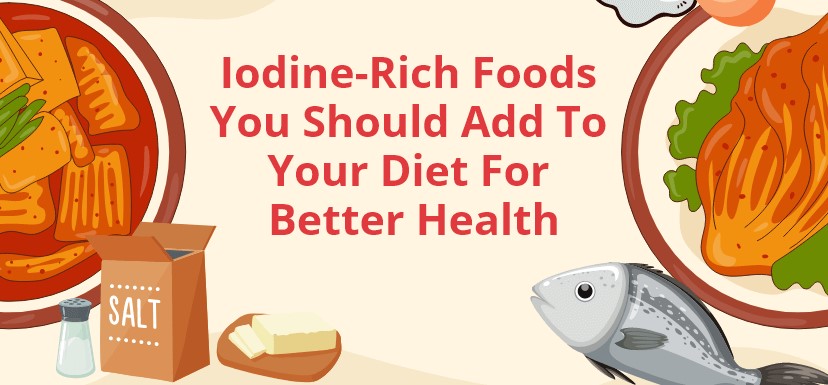Iodine-Rich Foods You Should Add to Your Diet for Better Health

Iodine-Rich Foods
Like other essentials for the body, we cannot live without iodine. The body does not synthesise iodine; hence, it must be supplemented through diet. Iodine is extremely helpful in producing necessary hormones in the thyroid gland.
Additionally, these hormones are responsible for regulating metabolism, energy levels, and natural development. Insufficient iodine can lead to many health issues due to a malfunctioning thyroid. Amazing sources rich in iodine include dairy, seaweed, fish, fruits, and beans. The foods listed below will help maintain a healthy and energised body
1. Iodine-Rich Foods: Seaweed (Kelp, Nori, Wakame)
Seaweed is considered one of the most nutritious foods. It is low in calories and offers abundant vitamins, minerals, and antioxidants. Its iodine content is especially important because iodine is crucial for the thyroid gland.
Seaweed has one of the highest iodine contents, but the amount varies depending on the type, its origin, and the method of preparation. Here are three types of seaweed that are well-known to be rich in iodine.
Kombu Kelp:
Kombu kelp is a type of brown seaweed that is popular and widely used in Japanese cooking for making dashi, a traditional Japanese soup stock. This seaweed is also found in coastal regions of India, where it is used in conventional foods.
Out of all known seaweeds, Kombu kelp is the greatest source of iodine.
Wakame:
Wakame has a mildly sweet taste and is brown in colour. It is often found in miso soup. Its source plays a role in determining its iodine content. Generally, wakame from Asia is believed to be richer in iodine
Nori:
Nori is a red seaweed commonly used in sushi rolls. Its iodine content is significantly lower than that of kombu kelp and wakame.
Pro Tip: For added iodine, consider using kombu kelp in broths or soups, wakame in salads or miso soup, and nori in sushi or as a handheld snack. Watch the amount to ensure it does not exceed the limits of iodine intake if you are particularly sensitive.
2. Iodine-Rich Foods: Shrimp
Shrimp is a delectable seafood that is low in calories and rich in nutrition. Its iodine-rich composition also benefits thyroid health.
Shrimp is a popular dish among coastal Indians in states such as Goa, Kerala, and West Bengal. As a seawater inhabitant, the Shrimp absorbs iodine naturally and therefore supports the dietary needs of iodine.
Pro Tip: Consuming shrimp daily can help meet iodine requirements. In addition to coastal curries, saltwater grilled shrimp can be tossed into salads to make the diet shrimp-rich. Shrimp should be balanced with other iodine-rich foods to maintain health.
3. Tuna
With lots of protein and few calories, tuna is one of the most loved fish. Its consumption benefits the heart as it contains omega-3 fatty acids.
Tuna is also very nutritious because it contains Potassium, Iron, and various B vitamins.
Although tuna contains more fat than สมัครสมาชิก UFABET วันนี้ รับเครดิตฟรีทุกวัน cod or haddock, it still contains iodine, which is essential for body health.
In India, the coastal states of Kerala, Goa, and Tamil Nadu utilise it in tasty curries, salads, and grills.